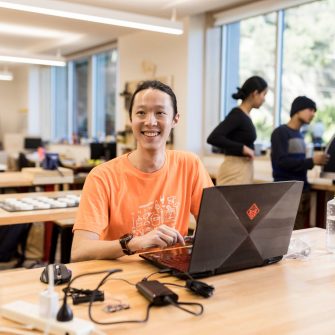Bachelor of Engineering (Honours) (Telecommunications)
- Commencing Terms
- Term 1, 2 & 3
- Duration
- 4 Year(s)
- Delivery Mode
- Face-to-face (includes blended)
- Campus
-
Kensington
- Codes
- UAC code 425100
- Program code 3707
- CRICOS code 056835E
-
ATAR/2025 lowest selection rank
- 92.0 View all admission criteria
-
2026 Indicative first year full fee
- $8,000*
-
2026 Indicative full fee to complete degree
- $37,500*
-
2026 Indicative first year full fee
- $61,500*
-
2026 Indicative full fee to complete degree
- $265,500*

Application closures for 2026
International applications for all undergraduate programs, as well as postgraduate programs offered by the faculties of Arts, Design & Architecture, Engineering (excluding Master of Information Technology and associated programs) and Science are now closed to New Overseas Student Commencement (NOSC) for 2026 intakes.
Postgraduate programs offered by the Business School and the faculties of Law & Justice and Medicine & Health remain open. Master of Information Technology (and associated programs) also remain open.
- Overview
- Entry requirements
- What will I study?
- Future careers
- Double degrees
- How to apply
- Fees & Scholarships
Overview
Telecommunications are responsible for a range of services used on a daily basis including landline and mobile phone services, internet and pay television. The widespread adaptation of high-speed digital transmission methods like fibre optic cabling and mobile telecommunications has resulted in significant changes in the industry.
Telecommunications Engineers design, develop and maintain all aspects of voice and data communications systems. They work on the theory and application of a broad range of systems such as telephone and data networks, radio and TV, satellites and deep space applications. To get you work ready, you'll apply these skills through 60 days of approved industry training.
You’ll be studying at Australia’s leading Engineering faculty. We're ranked #1 in Australia and #25 globally for Engineering and Technology. As well as this, all of UNSW's Engineering schools are ranked in the global top 50 with two schools ranked in the global top 10 for Engineering subjects (QS World University Rankings by Subject, 2025).
We're known as the leading Electrical Engineering school ranked #1 in Australia for Electrical Engineering (QS World University Rankings by Subject, 2025).
3707
056835E
Kensington
425100
192
Want to see more from UNSW Engineering?
Entry requirements
92.0
15.0
36.0
80.15*
-
- The 2025 Lowest Selection Rank (LSR) is the adjusted rank (ATAR plus adjustment factors) you would have needed to gain entry to this degree in 2025.
- The 2025 A levels score is based on four Advanced Level (A2) subjects. Entry scores are calculated from the best three or four A2 subjects (excluding repeated subjects) using the following values: A*=6, A=5, B=4, C=3, D=2, E=1. At most one Applied A Level subject may be included in the best four subjects used to calculate the aggregate.
- The 2025 IB Diploma is an indication of the IB you would have needed to gain entry to this degree in 2025. It is to be used as a guide only.
- The 2025 Lowest ATAR is the lowest ATAR (before adjustment factors were applied) to which an offer was made. Where <5 is listed, this indicates that less than 5 ATAR-based offers were made and so the score has not been published. N/A indicates no offers were made on the basis of ATAR.
*The Lowest ATAR to which an offer was made, for this program, is based on a UNSW Gateway Early Conditional Offer.
-
At UNSW, we are committed to ensuring prospective students have all the information they need in order to make informed decisions about their study options.
To assist you in gaining a better understanding of how Admissions works at UNSW, we have provided you with a summary of ATAR offers and the student profile.
We hope this information will help you identify the degree that is right for you.
Assumed knowledge
Mathematics Extension 1, Physics.
Adjustment Factors
We offer a range of adjustment factor schemes that reward students for academic performance and extra-curricular achievements. These schemes also take into account a range of personal and educational disadvantages that may have affected your studies.
HSC Plus
This scheme rewards students who perform well in Year 12 subjects that are relevant to their preferred UNSW degree. You may be awarded up to five points.
Elite Athletes, Performers and Leaders (EAPL)
This program recognises achievements in the areas of sport, academia, leadership and music at an elite level. You may be eligible for up to five points.
Educational Access Scheme (EAS)
Factors such as illness, financial hardship, language difficulties or attending a particular school can mean you don't always get the best possible marks in Years 11 and 12. If one of these situations applies to you, submit an application for the Educational Access Scheme (EAS) via UAC. Eligible students can receive between 1 and 10 points towards their chosen UNSW degree.
Admission pathways
TAFE/VET Pathway
This degree is eligible for the TAFE/VET Pathway. If you've completed a relevant TAFE/VET qualification, you may be eligible for automatic credit transfer. For more details, visit our TAFE/VET Pathway page.
Young Women in Engineering Pathway Program
This degree is eligible for admission through our Young Women in Engineering Pathway Program.* Participate in this five week program and work on an Engineering challenge, guided by academics and student ambassadors. Participants will receive an early conditional offer with an adjusted ATAR requirement upon the completion of the program and the submission of their project.
*inclusive of women, non-binary and gender diverse people
English language requirements
You may be asked to provide evidence of your English proficiency to study at UNSW depending on your educational background and citizenship. English language skills are vitally important for coping with lectures, tutorials, assignments and examinations - this is why UNSW requires a minimum English language competency for enrolment.
If you’re completing an Australian Year 12 qualification (e.g. NSW HSC or equivalent), you do not need to provide anything extra to prove your proficiency. Your qualification will be used as evidence of your English proficiency.
If you do need to provide evidence of your English proficiency, this will be indicated in your application. You can prove this by providing evidence that you meet one or more of the following criteria:
- English language tests and university English courses
- Prior study in the medium of English
- Other qualifications
If you need to improve your English skills before you start your degree, UNSW College’s Academic English Programs are for you. The programs are suitable for various English levels and help you prepare for university studies and life in Australia.
For more details, visit the English Language Requirements page.
International direct entry
Information for applicants with CBSE, HKDSE or Singapore A Levels Qualification
Calculating your CBSE Score:
Awarded by CBSE, average percentage marks across English or Hindi, and your best four remaining subjects. Where marks are given as a range, the mid-point for that range is used e.g. 75 to 80 = 77.5.
Calculating your HKDSE Score:
Entry requirements are based on the aggregate of the best 5 achieved category A subjects (category B and C subjects are not considered).
For subjects other than Citizenship and Social Development: level 5**=7 points, level 5*=6 points, level 5=5 points, level 4=4 points, level 3=3 points, level 2=2 points, level 1=1 point, Level U=0 point.
For subject Citizenship and Social Development: Attained=2 points, Unattained=0 point. Citizenship and Social Development will only be counted towards the aggregate if the 2 points awarded for Attained ranks among the student’s best five scoring subjects.
If Mathematics Compulsory Part and Extended Part (Module 1 or 2) are both presented, both scores can be counted.
Calculating your Singapore A Levels:
Due to significant changes to the GCE A-Level Curriculum and University Admissions Score (UAS) calculation effective 2026, UNSW assessment is currently under review.
Note: Entry requirements published on this page are correct as of the day of publication and may change without notice.
We do not accept secondary qualifications from this country. We may accept tertiary study results, please contact us for more information.
Please contact us for direct entry requirements.
Admission pathways
If you do not meet the requirements for direct entry into your chosen degree, you may be eligible for a pathway program with UNSW College. UNSW College provides alternative entry options using university-approved content so that you can start your UNSW journey with confidence.
English language requirements
You may be asked to provide evidence of your English proficiency to study at UNSW depending on whether you are from an English-speaking background or non-English speaking background. English language skills are vitally important for coping with lectures, tutorials, assignments and examinations - this is why UNSW requires a minimum English language competency for enrolment.
If English is not your first language, you’ll need to provide proof of your English proficiency before you can be given an offer to study at UNSW. You can do this by providing evidence that you meet one or more of the following criteria:
- English language tests and university English courses
- Prior study in the medium of English
- Other qualifications
If you need to improve your English skills before you start your degree, UNSW College’s Academic English Programs are for you. The programs are suitable for various English levels and help you prepare for university studies and life in Australia.
For more details, visit the English Language Requirements page.
Check the specific English language requirements for this program
Future careers
Accreditation
This degree is globally recognised and is accredited by Engineers Australia and acknowledged by the Washington Accord.
Part of this degree involves applying your skills through 60 days of approved industrial training in Australia or overseas. Your industrial training will give you a taste of a real-world professional engineering setting and the hands-on experience to become career-ready.
Double degrees
Combine your talents and passions to discover opportunities suited to your unique strengths. Despite the name, double degrees are not double the workload! You'll study core courses in two areas of expertise, graduating with two qualifications in less time than it takes to complete two consecutive degrees.
Double your knowledge, skills, and career options with the Bachelor of Engineering (Honours) and:
- Advanced Mathematics (Honours)
- Advanced Science (Honours)
- Arts
- Commerce
- Computer Science
- Engineering Science
- Fine Arts
- Law
- Science
- Master of Biomedical Engineering*
- Master of Electrical Engineering*
*Double Degree only available with some Bachelor of Engineering (Honours) specialisations.
How to apply
Applications for undergraduate study from domestic students (Australian citizens, Australian permanent residents, Australian permanent humanitarian visa holders and New Zealand citizens) are processed by the Universities Admissions Centre (UAC).
Visit the Apply section of the UAC website and you can nominate up to five degrees in order of preference, with the first being your most desired degree and university.
On-time applications for admission usually close at the end of September each year for Term 1 admission. Late applications can be submitted, but a late fee will apply. For study starting in Term 1, the majority of offers are made in December and January. Visit the UAC website for key dates for admission outside of Term 1.
Ready to start your application?
For most international students, applications are submitted via our Apply Online service. We encourage you to submit your completed application as early as possible to ensure it will be processed in time for your preferred term.
Some high-demand programs with limited places, may have an earlier application deadline or may have an earlier commencement date. For details, visit the international admissions information page.
*If you are an international student studying an Australian qualification, go to the Universities Admission Centre (UAC) for application and UAC key dates. Note: If you are under 18 years of age, you need to make special arrangements. For details, visit the under 18 international students page.
Ready to start your application?
Fees & Scholarships
Commonwealth Supported Place: Student Contribution Band 2
*The student contribution for a Commonwealth Supported Place is an indication only of the amount payable in Year 1 based on a standard full-time load of 48 credit points (1.0 EFTSL). The actual student contribution you will be liable for depends on your individual program of study and the calendar year in which you enrol. Actual fees are calculated upon enrolment. Student contribution amounts are subject to annual review by the university and may increase each year during your studies (subject to caps determined by the Australian Government), effective at the start of each calendar year.
The indicative fees listed here are based on an estimated average and are for tuition only - other fees and charges are not included.
*Fees are subject to annual review by the University and may increase annually, with the new fees effective from the start of each calendar year. The indicative fees listed here are based on an estimated average and are for tuition only, other fees and charges are not included. The amount you pay will vary depending on the calendar year to enrol, the courses you select and whether your study load is more or less than 1 Equivalent Full Time Student Load (8 courses per year).
Indicative fees are a guide for comparison only based on current conditions and available data. You should not rely on indicative fees. More information on fees can be found at the UNSW fees website.
Indicative fees to complete the program have been calculated based on a percentage increase for every year of the program. Fee increases are assessed annually and may exceed the indicative figures listed here.
Indicative fees to complete the program include tuition plus an estimate of study-related costs of approximately $1,000 per year. To find out more about other costs, visit UNSW International.
Scholarships
At UNSW, we award over $83 million in scholarships each year. We pride ourselves on rewarding excellence and making university accessible to students from all walks of life. Whether you’re a domestic or international student, our range of scholarships, prizes and awards can support your journey.
Progress starts here – at a world-leading university

Top 20 Worldwide
UNSW is ranked #20 university in the world
QS World University Rankings, 2024–2026

Most Employable Graduates
Winner of the AFR Most Employable University Award seven years in a row
AFR Top100 Future Leaders Awards, 2020–2026

Australia's #1 for Innovation
Highest number of startups and spinouts from university-developed tech
SCOPR report, 2024





